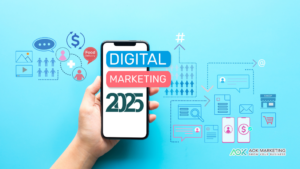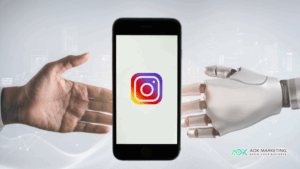The digital marketing landscape is rapidly evolving, with new tools, trends, and technologies emerging each year. As 2025 approaches, businesses and marketers alike are looking to stay ahead of the curve to remain competitive and relevant. For beginners, entering the world of digital marketing may seem daunting, but with the right strategies and knowledge, you can build a solid foundation and begin your journey toward digital success. This guide will introduce you to the key concepts, tools, and strategies to help you excel in digital marketing in 2025.
What is Digital Marketing?
Digital marketing refers to promoting products, services, or brands through various online channels, such as search engines, social media, email, and websites. Unlike traditional marketing, which relies on print, radio, or television, digital marketing leverages the internet and electronic devices to reach and engage target audiences. By using data-driven insights and digital tools, marketers can tailor their messages to specific audiences and track the effectiveness of their campaigns in real-time.
Why Digital Marketing is Essential in 2025
The importance of digital marketing is undeniable as the online landscape continues to expand. With consumers increasingly turning to digital platforms for information, entertainment, and shopping, businesses have more opportunities to connect with their audience than ever before. Digital marketing allows you to build brand awareness, generate leads, and drive conversions with precision and efficiency.
In 2025, digital marketing will be essential for businesses of all sizes. The rise of artificial intelligence (AI), automation, and personalization will further enhance marketers’ ability to reach their target audiences with highly relevant content. Embracing these trends now can give beginners a competitive edge in the future.
Key Components of Digital Marketing
For beginners, it’s essential to understand the core components of digital marketing and how they work together to create effective campaigns. Here’s a breakdown of the main elements:
1. Search Engine Optimization (SEO)
SEO is the process of optimizing your website so it ranks higher in search engine results, making it easier for people to find your content. Effective SEO can drive organic (unpaid) traffic to your site, leading to more visibility and potential customers. Key aspects of SEO include keyword research, on-page optimization (e.g., using headers, meta descriptions, and internal linking), and off-page optimization (e.g., link building and social sharing).
2. Content Marketing
Content marketing involves creating and sharing valuable, relevant content to attract and engage your target audience. This can take the form of blog posts, articles, videos, infographics, podcasts, and more. By addressing your audience’s pain points and interests, content marketing builds trust and credibility, leading to higher engagement and conversions.
In 2025, content marketing will focus heavily on personalization and high-quality, interactive content. Utilizing AI tools to understand audience preferences will help create customized experiences, making content marketing even more effective.
3. Social Media Marketing
Social media platforms like Facebook, Instagram, Twitter, LinkedIn, and TikTok are powerful tools for reaching and engaging your audience. Social media marketing involves creating and sharing content on these platforms to drive brand awareness, connect with customers, and encourage interaction.
To succeed on social media in 2025, it’s important to stay up-to-date with platform trends and algorithm changes. Short-form videos, live streaming, and interactive content (like polls and quizzes) are expected to be popular, and using these formats can increase your brand’s visibility and engagement.
4. Pay-Per-Click (PPC) Advertising
PPC advertising allows businesses to place ads on search engines (like Google) or social media platforms and pay only when a user clicks on the ad. PPC can provide instant visibility for your business and is particularly useful for reaching new customers or promoting specific products or services.
For beginners, Google Ads is a popular PPC platform that allows you to target specific keywords and demographics. In 2025, optimizing PPC campaigns with AI-powered bidding and targeting tools can enhance performance and ensure your ads reach the right people at the right time.
5. Email Marketing
Email marketing is one of the most cost-effective forms of digital marketing. It involves sending targeted emails to a list of subscribers to keep them informed, build relationships, and drive sales. Effective email marketing requires segmenting your audience, personalizing messages, and analyzing performance to improve results.
With advancements in AI and automation, email marketing in 2025 will be more sophisticated. AI-powered tools can help beginners personalize content, automate follow-ups, and send emails at optimal times, leading to higher open and click-through rates.
6. Analytics and Data Tracking
Analytics tools help digital marketers track the performance of their campaigns, understand audience behavior, and make data-driven decisions. Platforms like Google Analytics provide insights into website traffic, engagement, and conversion rates, while social media analytics tools track metrics like likes, shares, and comments.
In 2025, leveraging analytics to guide your strategies will be crucial. AI-powered analytics tools will offer predictive insights and allow you to optimize your marketing efforts in real-time. Familiarizing yourself with these tools now will help you make smarter, data-driven decisions as a beginner.
Emerging Trends in Digital Marketing for 2025
Digital marketing is constantly evolving, with new trends emerging each year. Here are a few key trends to watch in 2025:
1. Artificial Intelligence and Automation
AI and automation will continue to play a significant role in digital marketing. From chatbots and personalized recommendations to predictive analytics and automated content creation, AI will streamline processes and enhance customer experiences. Beginners should look for tools that offer AI-powered features to improve efficiency and effectiveness.
2. Voice Search Optimization
With the increasing use of voice-activated devices like Amazon Alexa and Google Assistant, optimizing for voice search is essential. Voice search queries are typically more conversational and longer than text-based searches, so using natural language and focusing on long-tail keywords will help you rank for voice search results.
3. Video Marketing
Video marketing will remain a dominant trend in 2025, with short-form videos, live streaming, and interactive video content continuing to drive engagement. For beginners, platforms like YouTube and TikTok provide easy entry points for creating engaging video content. Experimenting with different formats can help you connect with your audience more effectively.
4. Personalization and Customer Experience
Personalized marketing is becoming increasingly important as consumers expect tailored experiences. Using AI and data-driven insights, beginners can create content and campaigns that cater to specific customer segments. Enhancing the customer experience through personalized touchpoints and relevant content will be crucial in 2025.
5. Privacy-First Marketing
With stricter data privacy laws and growing consumer awareness, marketers need to prioritize privacy-first practices. Transparent data usage, ethical marketing, and compliance with regulations (such as GDPR) will be essential. Building trust with your audience through privacy-conscious marketing can set you apart from competitors.
Getting Started: Essential Steps for Beginners
If you’re new to digital marketing, here are some practical steps to get started:
Define Your Goals – Determine what you want to achieve with digital marketing, whether it’s brand awareness, lead generation, or sales.
Identify Your Target Audience – Research your audience to understand their preferences, pain points, and where they spend time online.
Choose Your Channels – Decide which digital marketing channels align with your goals and audience. For example, social media may be best for brand awareness, while SEO and content marketing can drive organic traffic.
Create Quality Content – Invest time in creating valuable, relevant content that resonates with your audience. Quality content is essential for SEO, social media, and email marketing.
Monitor and Analyze Results – Use analytics tools to track your performance and adjust your strategies as needed. Learning from your data will help you improve your campaigns over time.
Stay Updated – Digital marketing trends and tools change frequently. Follow industry blogs, attend webinars, and take courses to stay informed.
Final Thoughts
Digital marketing offers endless opportunities for growth, and with the right strategies, even beginners can make a significant impact. As we move into 2025, staying informed about trends, embracing new tools, and focusing on data-driven decisions will be key to success. By understanding the basics and continuously adapting, you’ll be well-equipped to excel in digital marketing and reach your business goals.
About The Author
Khalid Essam
Khalid is the Chief of Staff at AOK. He collaborates with a team of specialists to develop and implement successful digital campaigns, ensuring strategic alignment and optimal results. With strong leadership skills and a passion for innovation, Khalid drives AOK’s success by staying ahead of industry trends and fostering strong client and team relationships.






